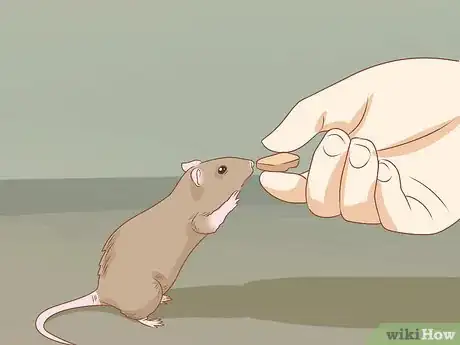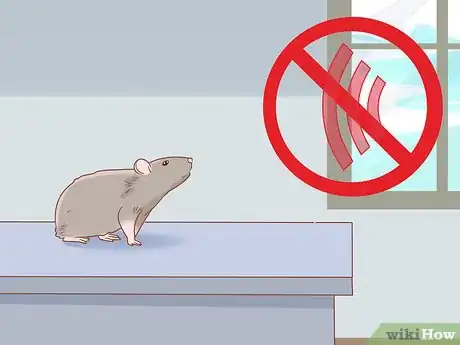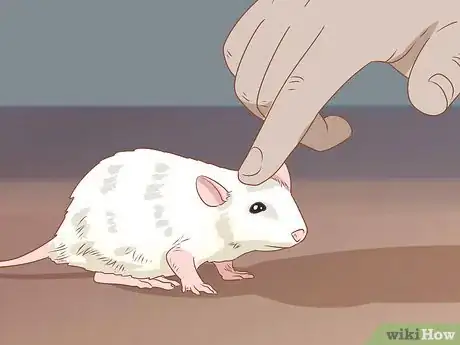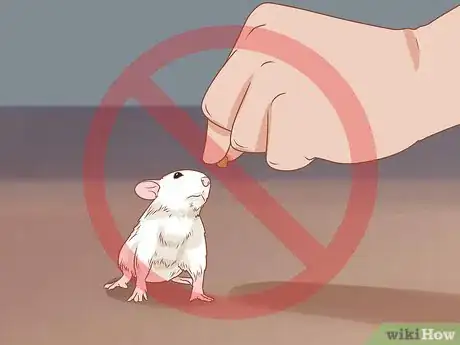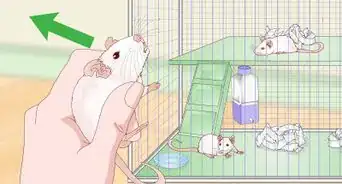This article was co-authored by Brian Starr. Brian Starr is a Rat Specialist and Breeder and the Owner of OC Dumbos out of Central Florida. As America’s only breeder of pet Roof Rats, Brian and OC Dumbos specialize in rat breeding, training, and care. Years of experience and several generations of careful breeding have allowed Brian and OC Dumbos to create a line of tame Roof Rats, bred to make friendly, fun pets. In addition to offering rat accessories and training resources, OC Dumbos also offers free Roof Rat adoptions.
This article has been viewed 34,823 times.
Because domesticated rats are playful, clean, intelligent animals, they make really fun pets. Rats enjoy learning, which helps them prevent boredom, and training a rat will help you bond with your pet. Teaching your rat its own name is an easy and fun first step in training. With a few treats and some practice, your rat will learn to recognize its own name and come to you when called.
Steps
Choosing a Name and Treats
-
1Choose a name with two syllables for your rat. Names with two syllables may be easiest to train with. Names with one syllable can be mistaken for common commands, like “stand,” “walk,” or “shake.” Names longer than two syllables can be confusing for animals or too clumsy to say out loud.[1]
- Examples of names you can use for your pet rat include: Cheddar, Minnie, Rizzo, Whiskers, and Remy.
-
2Use your rat’s favorite foods as rewards. Food is a great motivator for rats. Since they are omnivores, you can reward them with bits of lean meat, fruit, or vegetables. Offer your rat different bits of food and use the ones it seems to enjoy the most as a reward.[2]
- Try feeding your rat bits of carrot, grape, plain popcorn, or cheese to see which it likes best.
- Green peas are another great snack you can use.[3]
Advertisement -
3Place your rat in a quiet and familiar area for training. If you train your rat in a completely new space, it might get distracted by smells, objects, and sounds. A small enclosed room or a long table will give you enough space to move away from your rat, but not so much that it gets distracted.[4]
- If you are using its cage, make sure it is free of distracting food or toys during training.
Calling and Rewarding Your Rat
-
1Move a few feet away while holding a treat. Hold a treat in the palm of your hand so your rat can easily get to it. Your rat’s path to you should be clear of distractions and obstacles.[5]
-
2Call your rat’s name clearly. You may need to call your rat a few times until it comes to you. If your rat doesn’t seem to hear you or is not focused on you, move a little closer and try again.
-
3Reward your rat with food or petting when it responds. Give your rat the treat immediately once it reaches your hand. You can also reward it with petting, scratching, or verbal praise.[6]
-
4Repeat the call and reward method while moving further away. Slowly increase the distance between you and your rat. By repeating this positive reinforcement and increasing the distance, your rat will learn to come to you wherever you are.[7]
- Keep sessions 10 to 15 minutes long. Like humans, rats can become moody and tired. Take a break and try again another time if your rat begins to lose interest.[8]
-
5Stop using treats after your rat responds to its name consistently. Once your rat has learned its name, it will regularly come to you when you call it. When this happens, you can stop rewarding it with food and use only petting or verbal praise.[9]
Community Q&A
-
QuestionHow do rats navigate?
 Community AnswerRats navigate through their environment primarily using their whiskers -- they're even more sensitive than fingertips!
Community AnswerRats navigate through their environment primarily using their whiskers -- they're even more sensitive than fingertips! -
QuestionCan rats eat ketchup?
 Community AnswerYes, but it's not very healthy. You can give them a little as an occasional treat.
Community AnswerYes, but it's not very healthy. You can give them a little as an occasional treat. -
QuestionHow do I find a lost rat?
 Community AnswerTry setting a live trap around the place you believed you lost him and bait it with peanut butter. If he doesn't show up after a few days, move the trap to another location.
Community AnswerTry setting a live trap around the place you believed you lost him and bait it with peanut butter. If he doesn't show up after a few days, move the trap to another location.
Warnings
- Don’t push your rat during training. It may become tired and unfocused. When that happens, you should stop.⧼thumbs_response⧽
If your rats are struggling to learn, it is important to keep calm instead of raising your voice.
Things You'll Need
- Food treats
References
- ↑ https://www.petmd.com/dog/puppycenter/adoption/evr_dg_naming_your_puppy
- ↑ https://www.petmd.com/exotic/training/how-train-your-rat-simple-commands-and-tricks
- ↑ Brian Starr. Rat Specialist & Breeder. Expert Interview. 27 April 2021.
- ↑ https://www.petmd.com/exotic/training/how-train-your-rat-simple-commands-and-tricks
- ↑ https://youtu.be/UI8xTqjBdoc?t=64
- ↑ https://www.awlqld.com.au/wp-content/uploads/2016/07/Rat-New-Owner-Care-Guide.pdf
- ↑ https://www.awlqld.com.au/wp-content/uploads/2016/07/Rat-New-Owner-Care-Guide.pdf
- ↑ https://www.awlqld.com.au/wp-content/uploads/2016/07/Rat-New-Owner-Care-Guide.pdf
- ↑ https://youtu.be/UI8xTqjBdoc?t=105
About This Article
To teach a rat its name, stand directly in front of it and hold a treat in the palm of your hand. Next, call the rat’s name clearly, repeating it several times if needed until it responds. Once the rat reaches your hand, give it the treat immediately. Then, repeat the process, gradually increasing the distance each time. Finally, try calling your rat without offering a treat. Be sure to limit training sessions to 10-15 minutes so your rat doesn't get bored! To learn more about different rewards you can use for training, read on!

